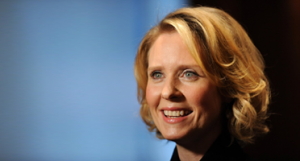 Earlier this year—crikey, has it already been nine months?—actress Cynthia Nixon took a great deal of heat from LGBT activists after she told the New York Times Magazine that her homosexuality is “a choice.” It may come as a shock to some (and my boyfriend is still reeling from this himself), but the time span between 1998 and 2004 included not a single instance of me-time that was devoted to watching “Sex and the City.” (In spite of this heresy on my part, please permit me my opinion.)
Earlier this year—crikey, has it already been nine months?—actress Cynthia Nixon took a great deal of heat from LGBT activists after she told the New York Times Magazine that her homosexuality is “a choice.” It may come as a shock to some (and my boyfriend is still reeling from this himself), but the time span between 1998 and 2004 included not a single instance of me-time that was devoted to watching “Sex and the City.” (In spite of this heresy on my part, please permit me my opinion.)
Nixon (who, for the edification of those who only know her by character name, played ginger-haired Miranda) has been in a same-sex relationship since 2004. Before that, she was involved for 15 years in a straight marriage that produced two kids.
I read with a lot of sympathy as Nixon spoke about the criticism she had gotten from gay rights groups for speaking her mind about nature-versus-nurture sexual identity. “I understand that for many people it’s not, but for me it’s a choice, and you don’t get to define my gayness for me,” she said Nixon, and I agree with her.
Part of the lonely road of the honest agnostic is our sincere wish that some tangible proof of Divine Existence drown out the silly apotheosistic part of us-versus-them theology. How can I be so sure that “we” are right when “they” feel exactly the same way about their (obviously heretical) beliefs?
Nixon addressed a like sentiment when she complained that, “A certain section of our community is very concerned that [sexual identity] not be seen as a choice, because if it’s a choice, then we could opt out. I say it doesn’t matter if we flew here or we swam here, it matters that we are here and we are one group and let us stop trying to make a litmus test for who is considered gay and who is not.”
I understand the strength and meaning that are created through sense of identity, and this plays into the difference between those who identify themselves as “gay” (like me, and maybe you, and for certain most of the men and women of the Gayborhood of Wilton Manors and the surrounding ‘gay ghettos’ in Victoria Park, Oakland Park, North Miami, and beyond.
Regardless of what you may think or heaven help us, feel), science has yet to identify the cause or basis—whether biological or sociological—for sexual orientation.
When she tried to ‘clarify’ her remarks for former Vanity Fair editor Tina Brown’s The Daily Beast, Nixon invoked the often-discomfort-inducing “bisexual,” and in some ways embraced it in the denial. “I don’t pull out the ‘bisexual’ word because nobody likes the bisexuals,” Nixon said tentatively, sensing her own tenuous position on the neither-fish-nor-fowl ledge. “Everybody likes to dump on the bisexuals. But I do completely feel that when I was in relationships with men, I was in love and in lust with those men. And then I met [partner Christine Marinoni], and I fell in love and lust with her. I am completely the same person and I was not walking around in some kind of fog. I just responded to the people in front of me the way I truly felt.”
The idea of bisexuals makes both “the straights” and “the gays” uncomfortable indeed. It just doesn’t fit in nicely with the idea of marriage, same- or opposite-sex. (“Who the hell do these ****ing bi’s plan to marry?”)
I sympathize with the traditionalists, who rightly see their way of life under assault. But the Neanderthal eventually got used to a new way of things, so Tony Perkins and James Dobson will find a way to cope. The question is, can gays make the same peace for their wayward bi’s?
“I’m just a woman in love with another woman,” Nixon offered meekly in February. That’s what she thinks.



